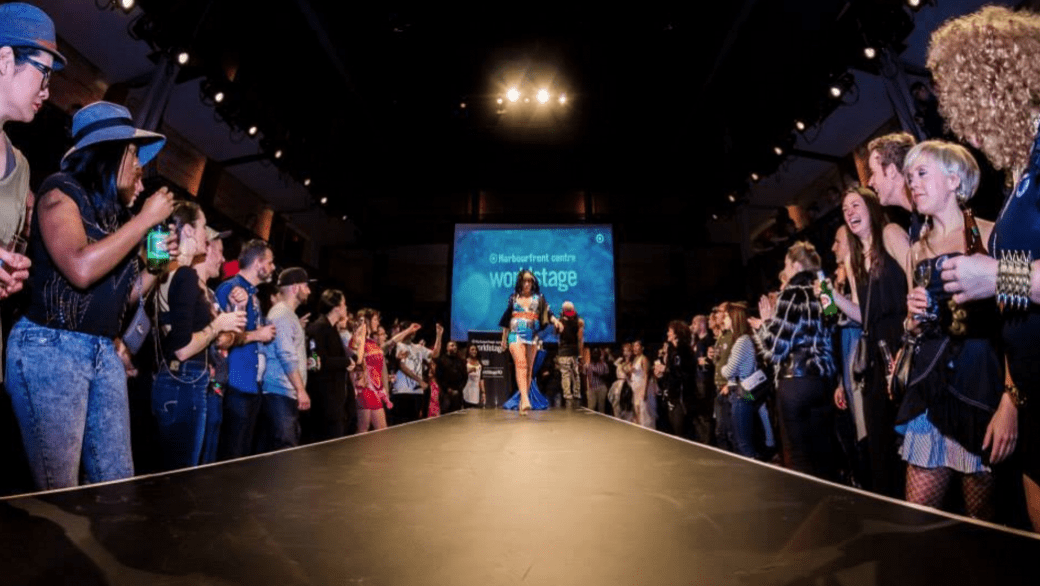“At what point does a subculture cease to be a subculture?” Matthew Sergi, one of World Stage’s scholars-in-residence poses the question at the recent “Subculture Futures” forum at Buddies in Bad Times Theatre in Toronto. Featuring local ballroom personalities Mother Trouble from the House of Nuance and Mother TKO from the House of Monroe, the forum serves as both an amuse-bouche for the sure-to-be-epic World Stage Mirror Ball event at Harbourfront Centre (details at the end of the article), and a sort of open-ended ball culture state of the union. So now that everyone and their gay mom knows how to throw shade, and both the essential documentary Paris is Burning and Madonna’s appropriation-licious “Vogue” have passed their 25th anniversaries, has the world of ballroom gone mainstream?
Bitch, please. Sure, your eight-year-old niece might be yelling “Slay, mama!” when Elsa finally lets it go, but it’s clear within minutes of hearing Trouble and TKO delve into the minutia, the terminology, and, yes, the nuances of Toronto’s burgeoning ballroom scene that anyone not actively participating in this fascinating subculture cannot possibly have more than a superficial grasp of its controversies, contradictions and its legendary essence. For instance, did you know that in addition to its “real” scene, Toronto also has a healthy “kiki” scene? “The kiki scene is a subculture of a subculture,” TKO says. While the real scene is built around competitive balls with trophies and cash prizes, the kiki scene is a more low-stakes environment were newcomers to the scene can get their feet wet and socialize across house lines.
What began decades ago as an underground phenomenon in New York City’s black queer scene has now evolved into an international movement. But in Canada, the history of ballroom isn’t really that old. The scene started picking up steam in the early 2000s and was cemented 10 years ago with the founding of the House of Monroe. “When I started voguing, nobody liked it. Everyone threw shade,” Seven, a founding member of the House of Monroe says. In Seven’s experience, the ballroom scene was a place disenfranchised youth could find family, guidance and mentorship. In recent years, the House of Nuance (founded in 2010) has helped nudge the scene even closer to mainstream culture, particularly by building a relationship with Harbourfront Centre and World Stage. While this partnership has allowed Toronto’s artistic cognoscenti access to ballroom, it hasn’t always been a two-way street. Despite being multicultural, queer, artistically rigorous and all kinds of things that typically look great on grant applications, balls are ineligible for arts council funding due to their status as competitions.
A new audience also means people aren’t necessarily on the same page in terms of identity politics, as last year’s Butch Queen Realness category proved. “People walked and were chopped because they weren’t seen as the definition of realness,” Trouble says. “which is that cis, straight, heterosexual thing. And they left feeling disrespected, discontent and defeated. I mean, there’s certainly a big question of identity wrapped up in that category, so when you have the courage to walk it, it’s strange to not have other people see the courage that you are exhibiting.” As a result, the realness category itself is chopped from this year’s ball, which Trouble makes clear is the decision of the House of Nuance, not World Stage.
The idea of handing out awards for queer people who can do the best job “passing” for straight is so problematic in the first place that some people will be glad to see the category quietly peace out. But realness is also a key part of a culture steeped in tradition. “There are four or five categories that make up ballroom culture,” Seven says, “and if you don’t have them, it’s not a ball.” It’s also a connection to a time when “passing” didn’t just mean winning a trophy, but possibly saving your life. For Seven, the problem is less about the category being politically incorrect, and more about a distinctly Canadian sensitivity. “You need to compete and keep coming back.” It’s a point TKO also picks up on. “Just because we’re competing at a ball doesn’t mean we can’t be friends outside the ball.”
After the forum wraps up, Trouble and TKO take to a corner of Talullah’s Cabaret for a quick kiki. Do they think that, with the decision to axe the realness category, this year’s ball will be less plagued by controversy? “Never!” Trouble says. “People will always find things to be offended about.” TKO gleefully chimes in: “I’m gonna give them things to complain about!” Confident as they are in the decision, they’re realistic about what it can accomplish. “Is there going to be a controversy? There absolutely will be,” Trouble says. “There’s probably going to be one inside the ballroom community and probably one outside of it as well.” Of much greater importance is how competitors plan to turn it out for this year’s “bizarre” category. “I’ve had a bunch of people tell me they are going in on it,” Trouble says. “And it’s ‘bring it as a mirror ball or a disco ball.’ There’s been a lot of discussion and chatter about what they’re up to and they’re not telling me what they’re gonna be, but I can’t wait to see what they’re gonna bring to the table.”
The World Stage Mirror Ball
Saturday, Jan 31, 2016
Harbourfront Centre, 235 Queens Quay W, Toronto
harbourfrontcentre.com

 Why you can trust Xtra
Why you can trust Xtra


